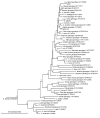Unusual Cryptosporidium genotypes in human cases of diarrhea
- PMID: 18976577
- PMCID: PMC2630733
- DOI: 10.3201/eid1411.080239
Unusual Cryptosporidium genotypes in human cases of diarrhea
Abstract
Several Cryptosporidium spp. are known to infect humans, but most cases of illness are caused by Cryptosporidium hominis or C. parvum. During a long-term genotyping in the United Kingdom, we identified 3 unusual Cryptosporidium genotypes (skunk, horse, and rabbit) in human patients with diarrhea.
Figures

References
MeSH terms
Substances
Associated data
- Actions
- Actions
- Actions
- Actions
- Actions
- Actions
- Actions
- Actions
LinkOut - more resources
Full Text Sources
Medical
Molecular Biology Databases
Miscellaneous
